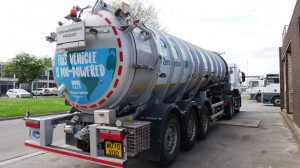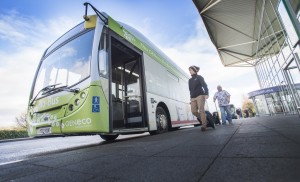Two sewage and food waste-powered trucks bought by utility group Wessex Water will hit Bristol’s roads this summer, ushering in a transport revolution that could potentially slash greenhouse gas emissions and improve the city’s air quality.
The vehicles, pictured, which follow in the tyre tracks of the firm’s pioneering ‘poo bus’, have been converted from diesel to biomethane to achieve carbon savings equivalent to removing more than 100 cars from the roads.

Like the ‘poo bus’, pictured below, which was a UK first, the new HGVs will be powered by biomethane (Bio-CNG, or compressed natural gas), which is derived from either liquified natural gas or the bi-product of the decomposition of organic matter.
The trucks will use fuel made from the anaerobic digestion of sewage and food waste at the Bristol Bioresources and Renewable Energy Park, at Avonmouth.
Wessex Water is the first water and sewerage company to transport both sludge and biosolid fertilisers using vehicles powered by gas from the waste it is treating.
Wessex Water director of bioresources Sean Hill said: “The tankers collecting sewage sludge for treatment and the trucks delivering the output fertiliser are both powered by the gas generated from this treatment, so we’re closing the loop when it comes to our recycling.

“This will make a huge difference to our carbon footprint and help improve the air quality of communities in our region, as well as improving operational efficiency and bringing cost benefits.
“Two vehicles have been purchased initially and we hope to eventually roll out the use of Bio-CNG across our entire tankering and biosolids fleet.”
Bio-CNG has several advantages over petrol or diesel, including reducing CO2 emissions by up to 84% as well as nitrous oxide emissions by up to 75%. The trucks are also much quieter than their diesel equivalents.
Bath-based Wessex Water has also been linked with plans for the world’s largest 100% renewable biomethane refuelling station at Avonmouth.
The station, now under construction and due to open later this year, will be able to refuel 80 HGVs an hour from 14 high-speed dispensers.






























